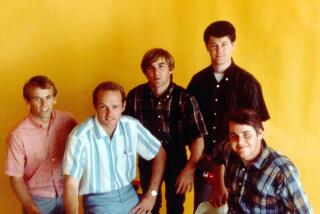Pop Music : Same Name, Different Game : The Waterboys’ Mike Scott returns to rock ‘n’ roll after his Irish-accented acoustic group splinters
- Share via
There were two bands called the Waterboys in 1990.
One was the seven-piece group that released “Room to Roam,” a light, largely acoustic album full of reveries of Ireland and one of its lasses, with music based on or inspired by traditional Celtic strains played on fiddle, accordion, flute, whistle and the likes.
The other was the stripped-down four-piece rock ‘n’ roll band that played a hard-edged set of dark, electric, Dylan-goes-European riffs, augmented by a punchy brass section, at the Universal Amphitheatre earlier this month, with hardly a jig or reel in earshot.
What these two bands have in common, name aside, is primarily group leader Mike Scott. Personnel and style changes can be as expected yet sudden in the Waterboys as a rain shower in Scott’s precious Ireland.
Two other band members, sax player Anthony Thistlethwaite and bassist Trevor Hutchinson, made the transition from the former lineup to the current, but the group is Scott’s baby. Once fiddle player Steve Wickham quit the Celtic-flavored version of the band after the recording of the album, Scott took that as an omen to change course altogether and decided to lose the other traditional instrumentalists in the group as well.
“That’s a very weird thing, touring a different show than the album that’s just come out,” admitted Scott backstage after the Universal show. “I wouldn’t wish that on anybody. If the ‘Room to Roam’ lineup hadn’t broken up, I would’ve been happy to tour that lineup. But when that band was over, I went for whatever would be good fun, which was rock ‘n’ roll and the brass section.
“When I started playing electric guitar in the band again, which was about four months ago, and all the traditional musicians left the band, that was a pretty clear demarcation point--folk on one side, and rock ‘n’ roll on the other.
“Yeah, it is the end of an era. And I don’t know where our music’s gonna go. I don’t think the Waterboys and Celtic music are finished with each other at all. It’s music that I’ve been listening to and playing for three years or so, and you can’t just stop like that. But the high point . . . is probably past.”
Though Scott says the traditional musicians of his adopted home, Ireland, are quite supportive of anyone taking it to a broader audience, not everyone has applauded his move into roots music. In a recent local concert, English singer John Wesley Harding parodied “Fisherman’s Blues” and its “wish I was a fisherman” sentiments, suggesting that Scott should really trade places with a fisherman and give him a shot at being a big rock star. “He’s not even Irish, you know,” Harding added derisively about Scott, who is originally from Scotland. “He just wears a cardigan.”
Wearing his omnipresent Dylan cap during the interview, Scott, 31, seemed reasonably gregarious for someone notoriously press-shy in recent years. He chuckled freely and mugged madly for a photographer.
Unlike most musicians, Scott prefers to talk to the press right after a show--he’s still up from the performance, he explained, and any tension that might arise in the interview won’t affect that night’s concert. He spoke of the changes in the group nonchalantly, as if it were no big deal to spin into a 180-degree turn mid-race.
Certainly the new edition of the Waterboys brings Scott’s creation closer to its early-’80s origins, when the group was more likely to be lumped in with U2 or Echo & the Bunnymen than the Chieftains. And a return to a purer rock sound may well restore the commercial luster that lost some of its shine during the two-album detour into Celtic sounds.
“I don’t think the record company liked us going into Irish music,” Scott confessed, “and I know when we were on the verge of recording ‘Room to Roam,’ there were a few comments from people here and there that it wasn’t what we should be doing.
“But I can’t pay any attention to that, can I? I’m not sitting there deciding, ‘Well, we’re going to do Irish music now.’ I’m just doing what the road seems to be taking me on.
“In fact, I shouldn’t even say it’s Irish music, because it’s not. Most of those tunes are Scottish. Scottish music is almost the same as Irish music; the Irish music is slightly better. Scottish music is jumpier, where an Irish tune will be very smooth and rolly.”
If the differentiation seems important to Scott, it may be because of his own divided loyalties: Though a Scottish native, Scott has been known to wax rhapsodic in song as well as conversation about the healing qualities of Ireland since his move there several years ago. “Scotland is my dreaming head / Ireland is my heart,” he sings in the latest album’s “Islandman.”
Karl Wallinger, now the leader of the band World Party, was a member of the Waterboys circa 1985. When he split to form his own group the next year, Wallinger expressed respect for Scott, yet with a whiff of disdain noted that he wanted to concentrate on a kind of spiritually themed songwriting that was “less esoteric, less up in the air, more down to earth” than the Waterboys’ sometimes wistful ethereality.
Scott was especially prone at the time to writing about the anticipation of something huge and undefined--the “Church Not Made With Hands” (“that precious place unmade by man”), “The Big Music” (“like jazz manna from sweet, sweet chariots”), “The Pan Within.”
It expressed the hope of the intangible--idealistic and sometimes dark in its unfulfilled longing. A typical lofty lyric from that time:
Man is tethered
Spirit is free
What spirit is man can be.
One suspects, however, that Wallinger may well like the new Mike Scott better. Not that he’s necessarily taken his head out of the clouds entirely, but the last two Waterboys albums--”Room to Roam” and its predecessor, “Fisherman’s Blues”--have been lighter in spirit and much more specific in personal detail.
There are paeans to Irish towns and paeans to the bride who he says is “the woman of my dreams”--including “A Man Is in Love,” a ballad of almost McCartneyesque simplicity and sentiment.
Performing that number on the piano at the Universal Amphitheatre, when the use of the third person switched to the first with the climactic line “A man is in love, and he’s me,” Scott threw his arms up in the air just as a giant red heart appeared on the screen behind the stage. It was as corny and romantic a moment as you could find in a rock ‘n’ roll show, let alone from this erstwhile sour spiritist.
Not to paraphrase Bono, but it almost sounds like Scott has found what he’s looking for.
“Well, I found ‘Medicine Bow,’ all right, and it was Ireland. And I found the woman that I was looking for when I wrote ‘Trumpets.’ I suppose now that I’ve found all that, I’ll be looking for something else pretty soon. There’s always something else to find and another adventure to be had.
“But probably when I wrote the songs you’re talking about, I wasn’t particularly happy with my lot in life and was kind of lonely as a person, and that probably comes out in the writing. But that circumstance isn’t the same now, so I probably won’t write like that now.”
Still, lonely or no, the “Room to Roam” album has its share of nods toward transcendence, such as the title track, with words taken from a poem by George MacDonald, the Scottish novelist and preacher who was considered orthodox in his Christianity aside from a controversial belief in universal salvation.
Scott shares MacDonald’s belief in “many days and many ways ending in one end” and insists that his own lyrical supernaturalism is not just metaphoric.
“I always believed in Jesus and God, but I’m not a practicing Christian or anything. I never had any problem with that from the first time that I heard about them when I was a little boy. Never any question. Always believed completely.
“And I believe in the Indian religion and I believe in Buddhism, and I believe all the religions are pretty cool. I’m not sure about the ones they have down there in the Gulf now, but the ones that I do know something about, I really believe in. And I believe in the human spirit and that what spirit is, man can be, and I believe that everything is alive and God is in everything. And I’ve always believed that, and I’m always trying to put it in songs and explain it properly.
“When I was writing (more recent) songs like ‘Has Anybody Here Seen Hank’ and ‘When Will We Be Married,’ they’re pretty down to earth, and I was aware of it. But I don’t want to stop writing things that are of a different kind of nature either. In fact, getting the sort of ethereal things in the skin of words that are down to earth--now, that would be something worth achieving.”
More to Read
The biggest entertainment stories
Get our big stories about Hollywood, film, television, music, arts, culture and more right in your inbox as soon as they publish.
You may occasionally receive promotional content from the Los Angeles Times.










